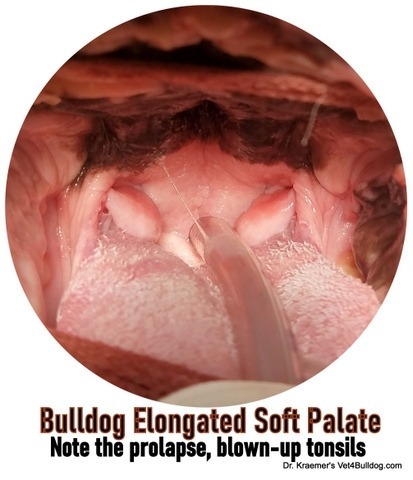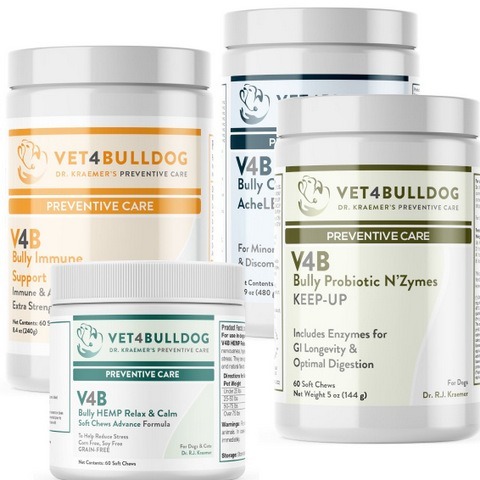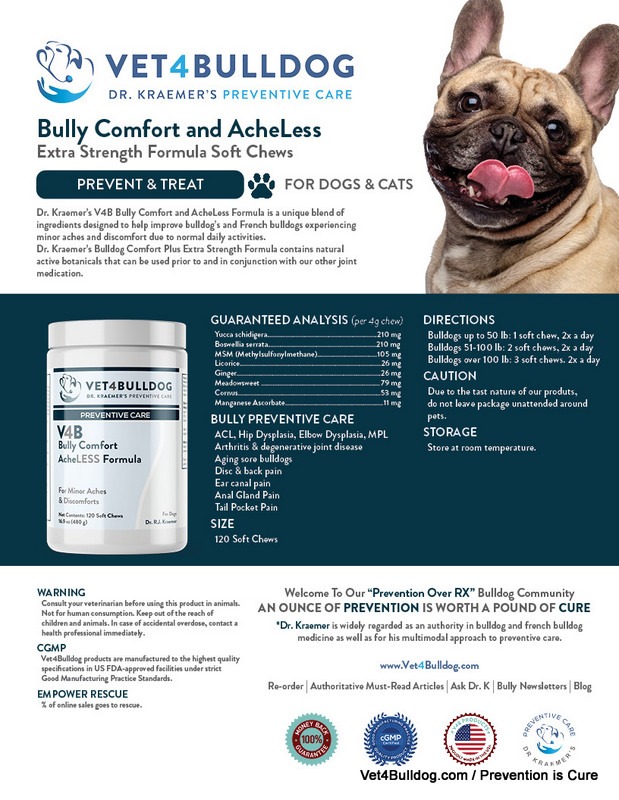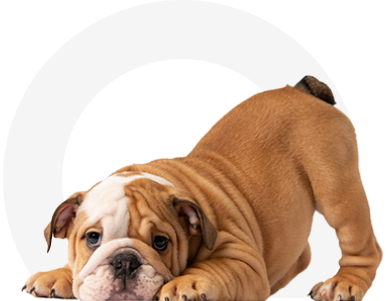Heat Strokes in Bulldogs
Heatstroke is more common in English and French Bulldogs than other canine breeds, primarily due to their flat heads (brachycephalic) and airway abnormalities.
- Pinched Nose
- Elongated Soft Palate
- Hypoplastic Trachea
- Everted Laryngeal Saccules

Sweat Glands in Bulldogs and French Bulldogs
Humans primarily cool themselves through sweat glands; bulldogs mainly rely on panting.
While panting is the primary cooling mechanism, your bulldogs may also seek out cold surfaces and airflow, such as cool floors, wind, and fans, to help regulate their body temperature.
Unlike humans, bulldogs mostly have sweat glands on their paws.
Temperature is regulated by a control center located in your bulldog’s brain.
HEAT AND HOT CLIMATE RISKS IN BULLDOGS
- Paw Thermal Burns: walking your bulldog on hot surfaces like asphalt can cause serious, painful burn injuries to the paws
- Skin Thermal Burns: sun (UV light), especially for non-pigmented areas such as the belly, nose, and ear tips, can cause burns and lead to cancer
- Dehydration: Dehydration will stress the kidneys and can escalate conditions that lead to heat stroke
- BOAS: Exposure to heat and hot weather will exacerbate respiratory problems associated with brachycephalic obstructive airway systems
A life-threatening heatstroke can occur when your bulldog can no longer regulate its temperature.
A body temperature of 106°F is life-threatening, and temperatures beyond 109°F are likely fatal.
BULLDOG FEVER vs. BULLDOG HEAT STROKE
FEVER: Fever is a normal response to infection or inflammation and acts as a defense mechanism to aid healing and recovery, so attempting to reduce a fever forcibly is generally discouraged.
HEAT STROKE: In contrast, bulldog heatstroke is an abnormal condition where the body’s thermoregulation fails, and requires immediate emergency cooling intervention.
HEAT STROKE EMERGENCY COOLING:
Active cooling should begin as soon as possible in cases of bulldog heatstroke to prevent severe health consequences and potential death.
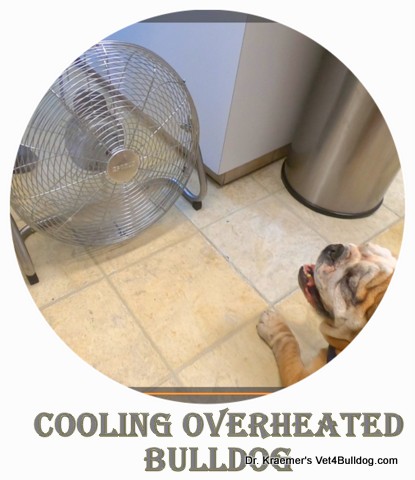
Causes of Heat Stroke in Bulldogs
- Hot Weather and Humidity (Exposure)
- Groomer Dryers
- Poor Ventilation and Poor Airflow
- Lack of Shade and Hydration

COMPOUNDING FACTORS INCLUDE:
The above primary conditions will be compounded and amplified by the following:
- BOAS (Brachycephalic Obstructive Airway Syndrome)
- Elongated soft palate
- Stenotic nares
- Hypoplastic trachea
- Everted laryngeal saccules
- Exercise: more so on a warm day
- Obesity
- Pain and Arthritis
- Shaving Coat (Removing Insulating Layer)
- Heart and Airway Disease
The number #1 compounding factor in bulldog heat stroke is BOAS
Symptoms of Heat Stroke in Bulldogs and Fr. Bulldogs
Heat stroke triggers an inflammatory response that affects perfusion, causes hypovolemia, and may lead to multiple organ failure, including the kidneys, heart, lungs, gut, and brain.
Key symptoms include:
- Respiratory
- Panting
- Labored Breathing
- Circulatory:
- Hypotension: perfusion problems
- Bleeding: clotting problems
- Shock
- Gastrointestinal (GI):
- Vomiting: damage to the gut microbiome
- Diarrhea
- Neurological:
- Unresponsiveness
- Seizures
PREVENTION IS CURE
Heat Stroke in Bulldogs and French Bulldogs / PREVENTION:
- COOL DOG WALKING SURFACE: don’t walk your bully on hot asphalt.
- Or have it painted with special cooling paint (see video).
- Check with your hand the temperature of the asphalt
- Use protective boots
- SUNBATHING: avoid sunbathing, especially for non-pigmented skin, as it can lead to skin cancer
- BOAS: early surgical repair of related conditions
- SHADE & WATER: proper protection from heat and sun and adequate hydration
- AIRFLOW & COOLING: fan, AC
- PAIN CONTROL:
- Analgesics
- Anti-inflammatories (NSAIDs)
- Bully Therapeutic supplements
- TRANSPORTATION: wagon

- CALM & RELAX: reduced stress and anxiety
- Nonstressful environment
- Nonstimulating environment (dog park, outdoor event, noise)
- Anti-anxiety rx
- Calming bully therapeutics
Heat Stroke in Bulldogs and Fr. Bulldog TREATMENT
If heat stroke is suspected, take your bulldog to the nearest emergency room.
Here are the steps to take and possible treatments:
AT HOME TREATMENT
- Check Rectal Temperature: Confirm heat stroke by taking your pet’s rectal temperature.
- Initiate Active Cooling: If heat stroke is confirmed, spray or soak your bulldog with tap water and place a fan over them. Have the AC on while transporting to the hospital.
AT THE HOSPITAL
- IV Fluids: To combat hypovolemia and support organ function.
- Oxygen: To support respiratory function.
- Pain Control: To manage discomfort and prevent further stress.
- Antibiotics: To prevent or treat infections.
- H2 Blockers or Proton Pump Inhibitors: To protect the gastrointestinal tract.

Additional Treatments:
- Dextrose: To manage blood sugar levels.
- Lidocaine: To treat arrhythmias.
- Mannitol: To reduce cerebral edema.
- Nutrient Support: Via nasogastric, esophageal, or stomach tube to ensure proper nutrition.
HEAT STOCK HOSPITAL MONITORING
- Blood and Urine Tests: Regular blood and urine tests are needed to monitor kidney function, blood cells, liver function, and overall health.
- Coagulation Profile: Check blood clotting ability to ensure no coagulation issues.
- Blood Pressure: Monitor blood pressure to ensure it remains within a normal range.
- Tissue Oxygenation: Use a pulse oximeter to monitor tissue oxygenation levels.
- Hypothermia: Continuously monitor body temperature to avoid hypothermia.
Stop active cooling once the temperature reaches 103°F. Keep monitoring; if the temperature drops below 100°F, start controlled warming to bring it back to a safe range.
Post-Treatment Care for Bulldogs Recovering from Heat Stroke
At Home Care:
- Prebiotics and Probiotics:
- Administer prebiotics, digestive enzymes, and probiotics to help restore and maintain a healthy gut microbiome, which may have been damaged during the heat stroke.
- Bully Probiotics Ultimate Bundle
- Administer prebiotics, digestive enzymes, and probiotics to help restore and maintain a healthy gut microbiome, which may have been damaged during the heat stroke.

- Calm & Relax:
- Ensure a calm and stress-free environment to promote recovery.
- Minimize physical activity and avoid exposing your bulldog to hot environments.
- Bully Therapeutics
- Bully StressLess Ultimate Bundle
- Immune Boosting:
- Provide a balanced diet rich in vitamins and minerals to support immune function.
- Consider supplements as recommended by your vet to boost the immune system.
- Comfort:
- Ensure your pet has a comfortable, cool, and shaded area.
- Provide plenty of fresh water and maintain a consistent routine to reduce stress.
- Bully therapeutics
Bulldog Heat Stroke Warnings
When treating a bulldog for heat stroke, it’s important to avoid certain methods that can worsen the condition:
- Avoid Cold Water, Ice Packs, or Ice: Do not use cold water, ice packs, or ice, as they can constrict blood vessels and impede the cooling process.
- Avoid Covering with Wet Towels: Do not cover your bulldog with wet towels, as this can trap heat and slow down evaporation, reducing cooling efficiency.
- Avoid Using Alcohol: Do not use alcohol for cooling, as it can be absorbed through the skin and cause toxic
Recommended by Owners Approved by Bulldogs




